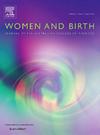性别、性别认同与妇女健康研究和平等:迫切需要清晰的语言和准确的数据收集。
IF 4.4
2区 医学
Q1 NURSING
引用次数: 0
摘要
背景:随着性别认同概念的日益突出,语言和数据收集正在发生变化,对妇女健康研究和平等产生重大影响。具体来说,涉及女性的语言正在被去性别化,关于性别的数据收集正在减少。2023年,澳大利亚国家卫生和医学研究委员会(NHMRC)就两份指导文件草案进行了公众咨询,讨论了在描述孕妇参与研究时使用“妇女”/“妇女”一词,以及性别和性别认同数据收集。我们合作撰写和收集对这两项协商的答复的支持。讨论:我们主张在与性别相关的情况下保留对woman/women的性别用法,强调解决性别歧视和女性数据差距需要将女性视为一个群体,并强调需要避免混淆、非人性化和排斥弱势群体。我们对性别认同数据的收集正在取代性别数据,以及性别数据的收集不准确表示担忧。我们建议NHMRC优先考虑数据的准确性,指导研究人员何时以及如何收集性别数据,并认识到个人并不普遍地将性别认同应用于自己。这些问题具有国际相关性,因为世界各地都在面临消除语言性别差异和优先考虑性别认同数据的压力。NHMRC现在已经完成了数据收集指导,不幸的是,我们的担忧在很大程度上被忽视了。结论:全球的研究人员和临床医生必须紧急参与有关性别语言和准确性别数据重要性的政策讨论,以保护个人和人口健康以及数据和研究的完整性。本文章由计算机程序翻译,如有差异,请以英文原文为准。
Sex, gender identity and women’s health research and equality: An urgent need for clarity of language and accurate data collection
Background
With the rise in salience of the concept of gender identity, changes are being made to language and data collection with major implications for women’s health research and equality. Specifically, language referring to women is being desexed and data collection on sex diminishing. In 2023, Australia’s National Health and Medical Research Council (NHMRC) undertook public consultations on two draft guidance documents discussing use of the words 'woman'/'women' when describing the involvement of pregnant women in research, and sex and gender identity data collection. We collaborated in writing and gathering support for responses to both consultations.
Discussion
We advocated retaining sexed usage of woman/women when sex was relevant, emphasising that addressing sexism and the female data gap requires identifying women as a group and emphasised the need to avoid confusion, dehumanisation, and exclusion of disadvantaged groups. We expressed concern that data collection on gender identity is supplanting that on sex, and sex data is not being accurately collected. We recommended the NHMRC prioritise data accuracy, guide researchers on when and how to collect sex data, and recognise that individuals do not universally apply gender identity to themselves. These issues have international relevance as pressure to desex language and prioritise gender identity data is occurring world-wide. The NHMRC has now finalised its data collection guidance, unfortunately our concerns were largely ignored.
Conclusion
Researchers and clinicians globally must urgently participate in policy discussion regarding the importance of sexed language and accurate sex data, to protect individual and population health and data and research integrity.
求助全文
通过发布文献求助,成功后即可免费获取论文全文。
去求助
来源期刊

Women and Birth
NURSING-OBSTETRICS & GYNECOLOGY
CiteScore
7.20
自引率
13.20%
发文量
371
审稿时长
27 days
期刊介绍:
Women and Birth is the official journal of the Australian College of Midwives (ACM). It is a midwifery journal that publishes on all matters that affect women and birth, from pre-conceptual counselling, through pregnancy, birth, and the first six weeks postnatal. All papers accepted will draw from and contribute to the relevant contemporary research, policy and/or theoretical literature. We seek research papers, quality assurances papers (with ethical approval) discussion papers, clinical practice papers, case studies and original literature reviews.
Our women-centred focus is inclusive of the family, fetus and newborn, both well and sick, and covers both healthy and complex pregnancies and births. The journal seeks papers that take a woman-centred focus on maternity services, epidemiology, primary health care, reproductive psycho/physiology, midwifery practice, theory, research, education, management and leadership. We also seek relevant papers on maternal mental health and neonatal well-being, natural and complementary therapies, local, national and international policy, management, politics, economics and societal and cultural issues as they affect childbearing women and their families. Topics may include, where appropriate, neonatal care, child and family health, women’s health, related to pregnancy, birth and the postpartum, including lactation. Interprofessional papers relevant to midwifery are welcome. Articles are double blind peer-reviewed, primarily by experts in the field of the submitted work.
 求助内容:
求助内容: 应助结果提醒方式:
应助结果提醒方式:


